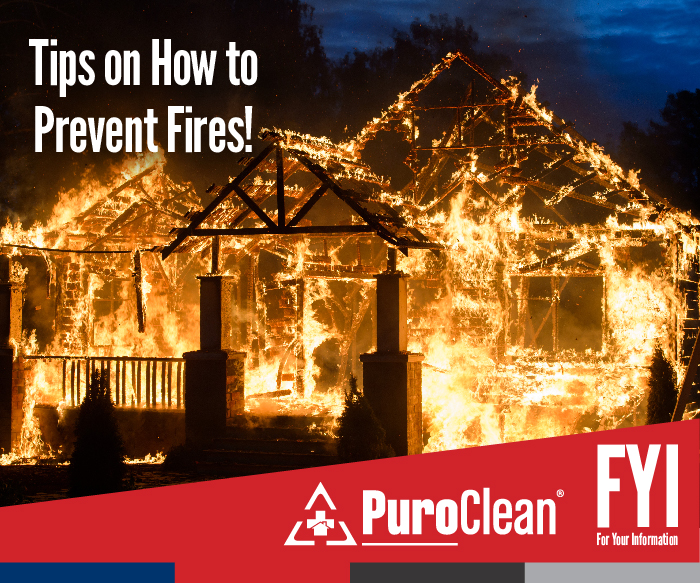
October is National Fire Prevention Month, dedicated to spreading awareness about fire safety. While learning about fire safety throughout the year is always a good idea, National Fire Prevention
Week (October 8-14) is a week-long campaign highlighting fire safety and prevention sponsored by the National Fire Protection Association (NFPA).
National Fire Prevention Week teaches people how to protect themselves and others from fires. In honor of National Fire Prevention Week, let’s look at some essential safety tips that can make a difference during a fire emergency.
How to Create an Emergency Plan
If a fire does happen, acting fast is your key to survival. Follow these tips to ensure you have a plan in place to evacuate as quickly and safely as possible:
- Know Your Exits. Draw a simple map of your home, showing all the doors and windows you can use to get out. Every room should have at least two ways to escape.
- Check Doors and Windows. Make sure doors and windows open easily so you can get out quickly.
- Choose a Meeting Spot. Decide on a designated safe place outside your home to gather after getting out.
- Practice Makes Perfect. Do mock fire drills at home with your family twice a year. This helps everyone know what to do in a real fire.
- Tell Others of Your Emergency Plan. Share your plan with guests or friends who visit your home and ask about their plans when you stay at their homes.
- Stay Low in Smoke. Practice getting down low and crawling to avoid smoke inhalation during a fire drill.
- Don’t Go Back Inside. If a smoke alarm sounds or you see a fire, leave the house and stay outside. Don’t go back in for any reason.
- Help Others. Ensure everyone knows the plan, especially kids and anyone needing extra help.
- Know how to Seal Yourself In (If Needed). In some situations, for example, if there’s a lot of smoke, it might be safer to stay in one room. Seal yourself in a room by closing the door and using something to block the space at the bottom of the door. Open a window a little bit for fresh air.
Essential Smoke Alarm Tips
Smoke alarms are your first line of defense against fires, so having ones that work correctly is integral to your home’s safety. Follow these guidelines to keep yours functioning and ready to alert you to any trouble:
- Install Smoke Alarms. Place smoke alarms inside bedrooms, outside sleeping areas, and on every level of your home, including the basement.
- Test Regularly. Test your smoke alarms at least once a month by pressing the test button. This ensures they are working correctly.
- Change Batteries. Change the batteries in your smoke alarms at least once a year, such as when you adjust your clocks for daylight saving time.
- Interconnected Alarms. If possible, connect all your smoke alarms so that when one alarm detects smoke, they all sound.
- Recognize the Sound. Everyone in your household should be familiar with the sound of the smoke alarm. They should know what to do when they hear it, too.
- Replace Old Alarms. Replace smoke alarms that are older than 10 years, or if they are not working as they should.
- Regular Maintenance: Keep your smoke alarms clean by gently vacuuming them with a brush attachment to remove dust and debris.
How to Prevent Fires
Preventing fires is critical to ensuring the safety and well-being of ourselves and our loved ones. Adopting proactive measures and adhering to safety guidelines can significantly reduce the risk of fires and their potentially devastating consequences. Here are some tips on how to keep yourself and others safe.
- Smoke Alarms Matter. Install smoke alarms in your home, especially inside bedrooms and on every floor. Check them every month and change the batteries at least once a year.
- Avoid a Kitchen Disaster. When cooking, remain in the kitchen and use a timer to remind you to check on any food that is being prepared. Avoid placing flammable items near the stove.
- Have a Fire Extinguisher on Hand. Have fire extinguishers in your home and ensure you know how to use them. They can be helpful during a small fire emergency.
- Keep Flammable Objects at a Distance. Fabrics, papers, and other flammable things should be placed far away from heaters and candles.
- Be Careful with Electrical Items. Check cords for damage; worn and frayed wires should be replaced. Don’t overload electrical outlets; an overwhelmed outlet could spark a fire.
- No Smoking Inside. If you smoke, do so outside and be careful with lit cigarettes.
- Teach Children About Fire Safety. Ensure they understand that matches, lighters, and candles are not toys. Store these items in a location that’s out of their reach.
Fire Damage? Call PuroClean for 24/7 Assistance
After a fire, reaching out to PuroClean for assistance can be a crucial step toward recovery. Our dedicated professionals have the expertise to swiftly and effectively address fire damage, restoring properties and helping you regain a sense of normalcy. With our specialized knowledge and resources, we stand ready to provide the support you need during a challenging time, offering our reassurance and guidance throughout the restoration process. Please check out our Fire Damage Services and contact us at (781) 486-3200 today.




 PuroClean of Wakefield
PuroClean of Wakefield